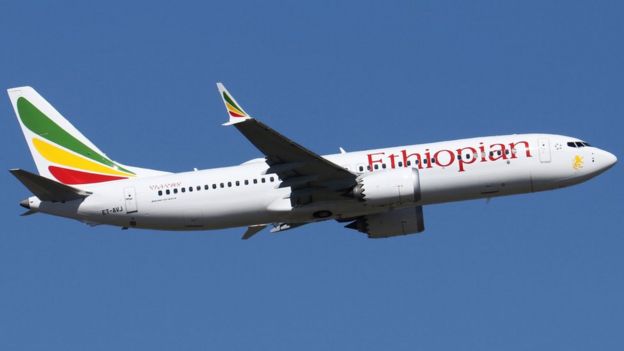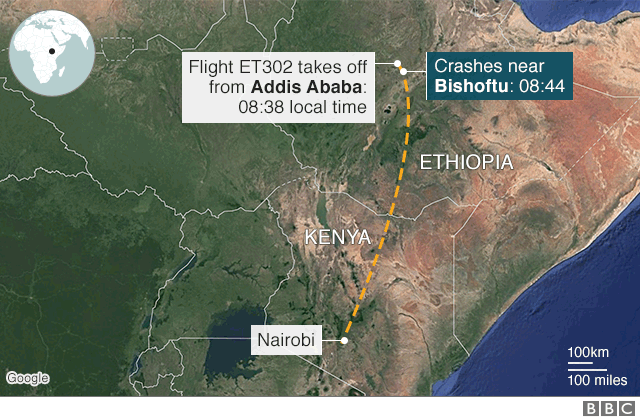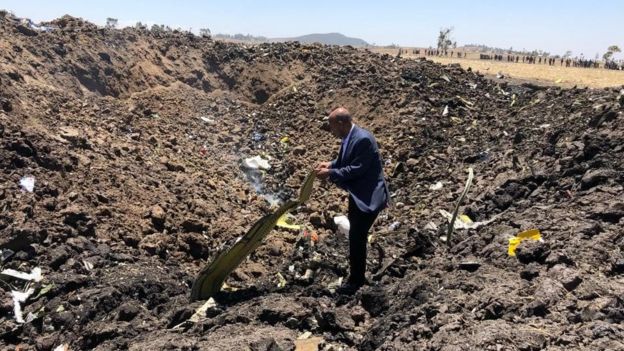
This article is more than
6 year old
The airline said 149 passengers and eight crew members were on flight ET302 from the Ethiopian capital to Nairobi in Kenya.
It said 32 Kenyans, 18 Canadians, eight Americans and seven British nationals were among the passengers.
The crash happened at 08:44 local time, six minutes after the months-old Boeing 737 Max-8 took off.
Another plane of the same model was involved in a crash less than five months ago, when a Lion Air flight crashed into the sea near Indonesia with nearly 190 people on board.
The cause of the disaster is not yet clear. However, the pilot had reported difficulties and had asked to return to Addis Ababa, the airline said.
"At this stage, we cannot rule out anything," Ethiopian Airlines CEO Tewolde Gebremariam told reporters at Bole International Airport in Addis Ababa.
"We cannot also attribute the cause to anything because we will have to comply with the international regulation to wait for the investigation."

Visibility was said to be good but air traffic monitor Flightradar24 reported that the plane's "vertical speed was unstable after take-off".
An eyewitness at the scene told the BBC there was an intense fire as the aircraft hit the ground.
"The blast and the fire were so strong that we couldn't get near it," he said. "Everything is burnt down."
First word of the crash came when Prime Minister Abiy Ahmed expressed his "deepest condolences" on Twitter.

Recovery operations were under way near the crash site around the town of Bishoftu, which is 60km (37 miles) south-east of the capital.
The plane was delivered to Ethiopian Airlines on 15 November last year. It underwent a "rigorous first check maintenance" on 4 February, the airline tweeted.
Mr Gebremariam told the news conference that passengers from more than 30 countries were on board the flight.
He said they included 32 Kenyans, 18 Canadians, nine Ethiopians, eight Italians, eight Chinese, eight Americans, seven Britons, seven French citizens, six Egyptians, five Germans, four Indians and four people from Slovakia.
Slovak MP Anton Hrnko later confirmed via Facebook that his wife and two children were on the plane.
Three Austrians, three Swedes, three Russians, two Moroccans, two Spaniards, two Poles and two Israelis were also on the flight.

There was also one passenger each from Ireland, Nepal, Saudi Arabia, Djibouti, Belgium, Indonesia, Somalia, Norway, Serbia, Togo, Mozambique, Rwanda, Sudan, Uganda and Yemen.
One person held a UN passport, the airline said. It believed some passengers could have been heading to a session of the UN Environment Assembly which begins in Nairobi on Monday.
A UN source also told Agence France-Presse that "at least a dozen of the victims were affiliated with the UN", and that this may include freelance translators.
World Food Programme executive director David Beasley said seven members of agency staff had died in the crash.
The WFP family mourns today -- @WFP staff were among those aboard the Ethiopian Airlines flight. We will do all that is humanly possible to help the families at this painful time. Please keep them in your thoughts and prayers.
— David Beasley (@WFPChief) March 10, 2019
One of the Canadian victims was named as Prof Pius Adesanmi, an expert in African studies at Carleton University in Ottawa.
The pilot was named as Senior Captain Yared Getachew who had a "commendable performance" with more than 8,000 hours in the air, the airline said.
The plane's First Officer Ahmed Nur Mohammod Nur had 200 flight hours, it added.
Ethiopia has declared Monday a national day of mourning.
Canadian PM Justin Trudeau said he was "deeply saddened" to hear of the crash, adding: "We join the international community in mourning the loss of so many lives."
UK PM Theresa May tweeted her condolences:
Read More (...)